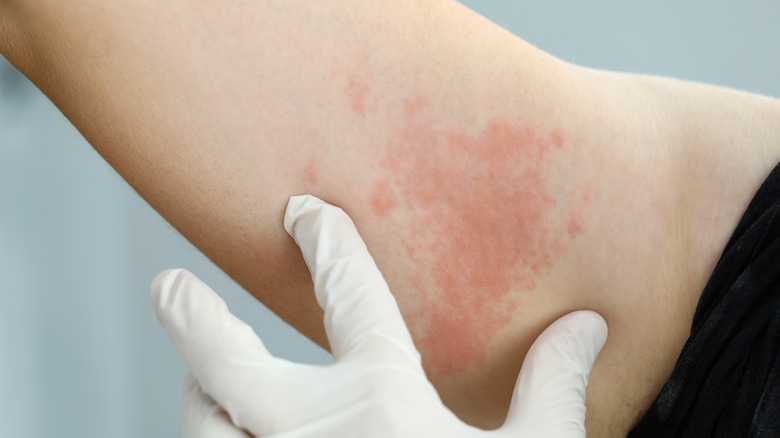Can Shingles Increase Your Risk Of Other Cardiovascular Complications?
Shingles is a disease that few seem to think much about until they experience a breakout. Also known as herpes zoster, shingles is a rash that can take on a blister-like appearance as it spreads (per the Centers for Disease Control and Prevention (CDC)). It often covers the front and back of one shoulder as well as the area in between, develops in one or two hands on one side of the rib cage, and may also appear on one half of the head.
The name "herpes" might have you wondering why the rash mostly affects the torso, but the name is somewhat misleading. Shingles is caused by the varicella-zoster virus, the same virus responsible for chicken pox. And since that virus stays in the body once it's contracted, anyone who has had chicken pox is at risk for shingles, according to Cleveland Clinic.
By itself, shingles is an inconvenient and painful condition. Unfortunately, as the CDC points out, it can also lead to several complications as well. The most common is PNH or postherpetic neuralgia. It's a severe and sometimes debilitating form of nerve pain experienced by 10% to 18% of people who develop shingles.
New research shows that shingles may increase a person's risk for other long-lasting complications as well. It turns out that the unassuming chicken pox virus might just damage a person's cardiovascular health.
The increased risk is real
The news first broke in a 2017 study according to Harvard Health Publishing. The study utilized a Korean health database of almost 520,000 people, 23,000 of whom had developed shingles at some point. Researchers found that people who had previously been diagnosed with shingles were 59% more likely to have a heart attack and 35% more likely to have a stroke.
An increased risk of heart disease isn't something most people want to face. Heart disease is the leading cause of most demographic groups in America according to the CDC, with an American experiencing a heart attack every 40 seconds. An American experiences a stroke at the same rate, one every 40 seconds, while one in six cardiovascular deaths are stroke-related (via the CDC).
Shingles isn't a condition to take lightly. Thankfully there is a vaccine, as detailed by the Cleveland Clinic. It can protect against not only shingles but the increased risk to a person's cardiovascular health that goes along with the condition, giving the vaccine an extra boost of benefit.


